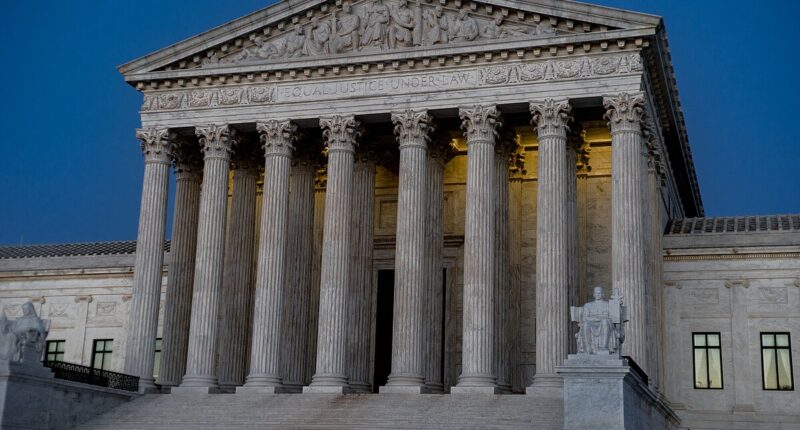Is the use of race in the redistricting process unconstitutional?
That’s a key question the U.S. Supreme Court will be considering in a pair of high-profile cases set to be argued before the justices on Wednesday. Known as Louisiana v. Callais and Robinson v. Callais, the matters provide the court with the opportunity to end longstanding conflicts between the Constitution and race-centric voting provisions that have plagued states and the redistricting process for decades.
We believe these cases are “good vehicle[s] for the Supreme Court to address some of these issues that have been percolating for a very long time,” Louisiana Attorney General Liz Murrill told The Federalist.
As The Federalist previously reported, the origins of the dispute date back to spring 2022, when the Louisiana Legislature drafted a congressional map with a single black-majority district. This prompted a group of plaintiffs — represented by left-wing groups like the ACLU — to sue, alleging that the map “dilut[ed] black voting strength” and therefore violated Section 2 of the 1965 Voting Rights Act.
Following an injunction barring the map’s implementation by a district court judge, continued litigation in the case ultimately resulted in the state redrawing the map to include a second black-majority district. This led to another lawsuit from a different group of plaintiffs, who claimed the state unlawfully prioritized race in the map’s creation and therefore violated the 14th Amendment’s equal protection clause. A three-judge panel on a separate district court agreed with these plaintiffs and blocked the new map’s implementation.
While the Supreme Court agreed to take up the case and was expected to issue a verdict during its 2024-2025 term, the justices announced on the final day of the session that it would be rehearing arguments in the case this fall. The court notably issued an order in early August instructing parties in the case to address the question of “[w]hether the State’s intentional creation of a second majority-minority congressional district violates the Fourteenth or Fifteenth Amendments to the U. S. Constitution.”
[READ: The Federalist’s Guide To The 2025 Supreme Court Term]
Speaking with The Federalist, Murrill said the Callais cases provide a good example of how left-wing groups and attorneys have “effectively weaponized” the judicial system “against states and their legislative process” when it comes to redistricting. By challenging maps that disadvantage their political allies under Section 2 of the VRA, the Republican attorney general noted, these Democrat-aligned activists “can pick their venue — kind of hand-choose their federal district court judge in some cases — and bring the case strictly under Section 2, which means there’s only one judge that’s going to decide the case and make all the factual findings.”
“That allows for substantial manipulation of the manifest error standard of review to benefit those plaintiffs and … almost entirely foreclose review of those factual findings on appeal. If there were a constitutional challenge, it’s a three-judge court, and so that, I think, helps guard against judge shopping,” Murrill said.
As The Federalist reported, this ongoing weaponization of the judiciary has largely been made possible by confounding SCOTUS precedent on the use of race in redistricting and friction between Section 2 of the VRA and the 14th Amendment. In its 1993 Shaw v. Reno decision, for example, the high court effectively ruled, as The Heritage Foundation’s Hans von Spakovsky previously summarized, that “race cannot be the predominant factor when you do redistricting” [emphasis added].
“I think that there’s just been this evolving jurisprudence emanating specifically from the Supreme Court that legislatures have had to kind of make sense of and apply in carrying out their constitutional duty to draw maps. … That jurisprudence is not easy to understand, and in some cases, it’s entirely illogical,” Murrill said. Simply saying, “‘Race can’t predominate,’ is not a workable standard, and I don’t think it ever made any sense. [The court is basically saying], ‘You can think about race, [but] you just can’t think about it too much.’”
In its brief filed with the Supreme Court in late August, Louisiana argued that the consideration of race in the redistricting process is unconstitutional, noting that America’s founding document is “color blind.” The state further claimed that the 14th Amendment’s equal protection clause “commands that the government ‘may never use race as a stereotype or negative,’” and “Yet race-based redistricting rests on an invidious stereotype: that all minorities, by virtue of their membership in their racial class, think alike and share the same interests and voting preferences.”
“Louisiana wants out of this abhorrent system of racial discrimination. The Court should answer yes to the question presented for reargument — the intentional creation of a second majority-minority district in [Louisiana’s most-recent congressional map] is unconstitutional — and affirm the judgment below,” the brief reads.
Should the Supreme Court deem race-based redistricting to be unlawful in its upcoming decision, Murrill predicted that such a precedent would “significantly reduce, if not entirely eliminate,” the ability of left-wing activists and lawyers to “strategically pursue strictly Section 2 cases with friendly judges, get their fact finding all lined up to their benefit, and then force legislatures into creating majority-minority maps where the whole objective is to build a district that is predominantly one race or the other.”
“We’ve always thought that our case … was the right vehicle and the right set of facts to evaluate that friction [between Section 2 of the VRA and the 14th Amendment’s equal protection clause],” Murrill added.
Oral arguments in Louisiana v. Callais and Robinson v. Callais are expected to begin at 10 a.m. ET on Wednesday. A final decision on the matter is not expected until later in the Supreme Court’s 2025-2026 term.
Shawn Fleetwood is a staff writer for The Federalist and a graduate of the University of Mary Washington. He previously served as a state content writer for Convention of States Action and his work has been featured in numerous outlets, including RealClearPolitics, RealClearHealth, and Conservative Review. Follow him on Twitter @ShawnFleetwood









